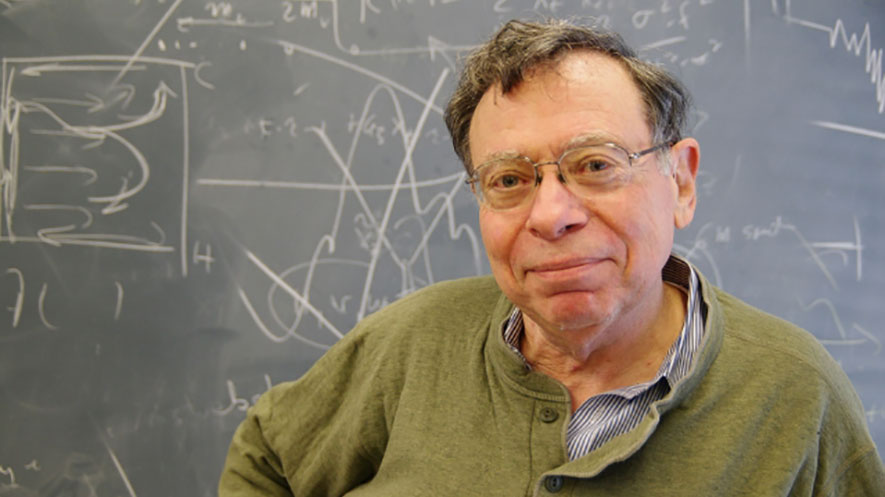Carl Wunsch continues to expand his foundational framework for understanding the behavior of worldwide oceans as a whole.
Before the advent of modern observational and modeling techniques, understanding how the ocean behaved required piecing together disparate data — often separated by decades in time — from a handful of sources around the world. In the 1980s, that started to change when technological advancements, such as satellites, floats, drifters, and chemical tracers, made continuous, mass measurements possible.
Still, the resulting new datasets often existed independently of each other, obscuring the big picture of how the ocean circulates, transfers heat, affects climate, stores carbon, and more. That's why Carl Wunsch, professor emeritus of physical oceanography in MIT’s Department of Earth, Atmospheric and Planetary Sciences (EAPS) and member of the EAPS Program in Atmospheres, Oceans and Climate (PAOC), started spearheading an endeavor to reveal that big picture nearly 20 years ago.
Following on the heels of the World Ocean Circulation Experiment (WOCE), Wunsch founded a consortium that sought to combine global ocean datasets with state-of-the-art circulation models. Only with this combination of observation and theory could scientists fully understand the physical and dynamical state of the ocean, and thus its role in climate, Wunsh wrote for the journal Oceanography in 2009. The consortium, which came to be called Estimating the Circulation and Climate of the Ocean (ECCO), was a massive undertaking, including an international network of researchers and governmental bodies to exchange and analyze billions of ocean observations taken from all corners of the globe.
“It was like building a large telescope,” Wunsh says. “That’s what ECCO has been.” Today, ECCO is largely heralded as the foundational framework for understanding the behavior of the entire ocean for decades to come. Last month, Wunsch and his collaborators published a progress report of sorts on ECCO efforts in The Bulletin of the American Meteorological Society, where they detail the best record of ocean circulation to date: a 20-year average of ocean climate and circulation, called a climatology, that obeys the laws of fluids and includes all of the data collected on the ocean from around the world since 1992.
In the article, “A Dynamically Consistent, Multivariable Ocean Climatology,” the authors outline recent updates to ECCO and explain the deep trove of information that makes it possible, including observations from all of the altimetric satellites that have flown since 1992; temperature and salinity data from depth sensors, expendable bathythermographs, and Argo profiles; and — perhaps most fascinating — data collected via sensors on deep-diving elephant seals.
With an immense volume of data — several billion observations — Wunsch and his collaborators write that the problem soon became how to combine the massive datasets and fit them to a model that would represent a three-dimensional time-evolving ocean over decades. Fortuitously, during ECCO’s initiation, a parallel effort at MIT was underway, led by EAPS Cecil and Ida Green Professor of Oceanography John Marshall, to develop a new ocean general circulation model, called the MIT General Circulation Model, which Wunsch adapted to become the dynamical engine of ECCO.
Detailed understanding of the accuracies and precisions of this methodology, including at least some approximation to an error estimate on all scales, is “an unglamorous but essential activity,” Wunsch says.
Unglamorous as the methodology may be, the results are elegant solutions that adequately fit almost all types of ocean observations and that are, simultaneously, consistent with the model. These solutions are now being used to inform a wide range of research, ranging from ocean variability, biological cycles, coastal physics, and geodesy. Some studies have involved more immediate applications, like predicting physical flow and mixing fields, which influence the ecosystems of lobsters and cod. Others offer better resolution into big-picture issues, like ocean carbon absorption, sea level rise, climate forecasting, and paleoclimate.
With ECCO, analyzing these problems is no longer confined to the use of single datasets, and researchers are freed from worries that basic properties such as energy conservation are violated in the analysis, says Wunsch.
“It’s a luxury to think about the long term,” he says. But, he adds, it is a scientific and social necessity and requires decades more data to go beyond 20 to 30 years. Today the ECCO effort stands as proof that model-data combinations looking at decadal and longer time scales are possible, says Wunsch. But the consortium’s goals don’t end there.
“We want this climatology to be used for a greater variety of purposes, and we invite the use and critique of the result by the wider community,” he says. All of the data and the model are publicly available, Wunsch says, and if someone is interested, all they have to do is ask for help.
Wunsch, who is retired but still has an office in the Green Building at MIT, says gladly that his former students and group members have now taken over the ECCO effort. In fact, the article co-authors were all once Wunsch’s advisees: Associate Professor Patrick Heimbach of the University of Texas at Austin, Principal Scientist Ichiro Fukumori of the NASA Jet Propulsion Laboratory, and Rui M. Ponte of Atmospheric and Environmental Research (AER), Inc. Wunsch hopes that ECCO’s spread to the next generation of researchers will make it more resistant to fickle political and economic trends. Because understanding how the ocean is behaving under a changing climate — and how it is likely to change in the future — requires uninterrupted observations of the immense complexity of ocean circulation.
“There can’t be any gaps in data,” said Wunsh. “Gaps are deadly.”



